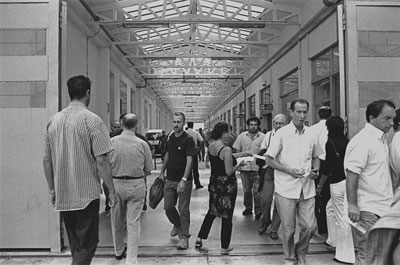10th september> 4th november 2007
Pontedera
The factory workers have disappeared from the common imaginary. The current social reference models are more similar to a football player's carrier or to a pop singer's one than to factory life of workers. Nevertheless, not many decades ago, the working class was considered by many a social vanguard to be taken as a model. What has changed since then ? Is the collapse of Soviet Union sufficient to explain this systemic change? Or maybe it is necessary to adopt an analysis method more complex which considers the changes in the forms of belonging and of consumption occurred in Western societies? Who are the factory workers today, what do they think about their being factory workers and which are the forms of conflict and of communion which are developed in the factory at present ? These are some of the questions which gave start to the project Postfordist reality carried out in the city of Pontedera with the young artists and the video-makers of Networking 2007. Carrying on with their own course of tight connection between artistic practices and territorial context, the Social Lab of Pontedera achieved the presence of a large group of factory workers of the Piaggio company. The history of the city of Pontedera itself is linked to the one of the biggest factory of the centre of Italy. Even if the number of employees of the factory has been reduced a lot during the 80s and the 90s , shifting from 12.000 to the 3.300 at present, the link with the city is still very strong and felt by all the citizens. At the same time this internal change to the factory has been accompanied by an important change in life styles, in the forms of consumption and of social relationships occurred in the European cities. These changes, described by many with the name of Postfordism, are related in the city of Pontedera to a still strongly Fordist experience like the Piaggio's factory one, in an interesting link and mutual exchange which allows to reconsider many aspects of the passage from Fordism to Postfordism.
The workshop was carried out thus in the exchange which was born between the young artists taking part to it and the factory workers of Piaggio in order to create a permanent file for the Centro per l'arte Otello Cirri on the changes in the work world. |
The research was both photographic and video with the production of more than 1500 photos and 8 hours of interviews recorded with Piaggio's factory workers. Among the many themes emerged from the conversations with the factory workers, some of them turn out to be recurring and largely shared. Among these, the shakiness of the work which concerns short-term contracts with which one can enter Piaggio nowadays is felt by many workers. What worries more about this condition is the difficulty to which one is exposed of planning one's own future, buying a house, have children, planning a family. At the same time it turns out how the social panorama of the factory is fragmented in different generation experiences and within the same generation the emerging aspects vary with the variation of kind of contract with which one was employed. The perspective of who has worked in Piaggio for some decades can tell a deep change in the way of living the factory. Entering Piaggio in the seventies meant entering a world which had an important social role, a way of being which would mould one's own life and which would probably never change. Who enters the factory in recent years instead with a short-term contract knows that very probably it won't be his or her work in the long run and necessarily prepares himself/herself to change. This different perspective can only influence the link which is created in the factory, the chance of organizing fights to claim new rights, the chance of feeling as a social class. The need to tell and to tell about oneself emerged thus, during the meetings as a possibility to recognize oneself and represent oneself in a contemporary social panorama.
The course ended with the final exhibition which presented a selection of the pictures taken which took the form of close portraits and of portraits with a background, details and life scenes from the factory. A selection of the achieved interviews traced a reading guide of the whole course covered. At the presentation of the exhibition the philosopher and director of the philosophy magazine "Millepiani" Tiziana Villani intervened and analysed the meaningful connection which nowadays links the artistic sphere of production to the forms of social action and production of new subjectivities.
|










